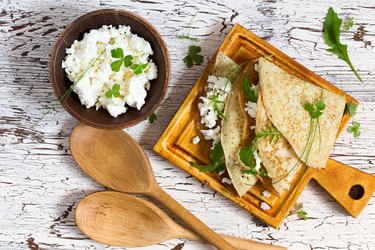
Every cheese lover is passionate about their preference: Some are brie buffs, feta fanatics or Swiss supporters. And while all palate-pleasing pressed curds have their merits, one — which is equally as delicious as it is nutritious — takes the cheese.
We're talking about farmer cheese, folks.
Video of the Day
Video of the Day
A fresh, soft, spreadable cheese, farmer cheese is similar to cottage cheese, but boasts a firmer, crumblier texture and a tarter, tangier taste thanks to processing when most of the whey liquid is pressed from the curds, says Susie Polgreen, RD, CD, an associate at Whole Health Nutrition.
And though this super-versatile cheese can perk up any recipe from pierogis to parfaits (literally, farmer cheese can do it all) and fit into most diet plans, where it really shines is its health benefits, such as promoting a healthy gut and strong bones.
Here's why farmer cheese is truly the big cheese (and why you should add it to your weekly grocery list).
Why Farmer Cheese Is So Good for You
One ounce of farmer cheese contains the following, according to the USDA:
- Calories: 80
- Total fat: 7 g
- Saturated fat: 4.5 g
- Sodium: 180 mg
- Total carbs: 0 g
- Protein: 6 g
1. It Maximizes Muscle Growth and Metabolism
With 13 grams of protein per 1/2-cup serving, farmer cheese is a stellar source of this important macronutrient, says Leslie Langevin, RD, author of The Anti-Inflammatory Kitchen Cookbook and co-owner of Whole Health Nutrition.
Protein supports muscle mass, metabolism and satiety, Polgreen says. That means every time you spread a salivating smear of farmer cheese on your bread or sprinkle some onto your salad, you're helping build lean muscle, revving up your metabolic engines and satisfying your stomach.
Farmer cheese is an especially great addition to vegetarian fare as it can provide a powerful protein bump to a meatless meal, Langevin adds.
2. It’s Good for Your Gut
"Cultured farmer cheese contains probiotics, which are beneficial gut bacteria that support digestive and immune function," Polgreen says.
But keep in mind, not all farmer cheese varieties include probiotic cultures. Some are made with an acid (like lemon juice or vinegar) to separate the curds and the whey in the milk (i.e., to create the solids), Langevin says.
So, if you're foraging for gut-friendly farmer cheese, always look for "live active cultures" listed on the ingredient list, Polgreen says.
3. It Promotes Bone Health
While calcium is essential for our bones and tissues, it's often lacking in the American diet, Polgreen says. "It's estimated that almost half of Americans don't get enough," she adds.
But fitting farmer cheese into your daily meal plan can help ensure you're taking in this mighty mineral. Just 1 ounce of farmer cheese contains 200 milligrams of calcium, per the USDA. That's 15 percent of the recommended daily value (DV).
4. It's Low in Lactose
"One of the most unique characteristics of farmer cheese is its very low lactose content — most varieties contain less than 0.5 percent lactose," Polgreen says. "This is because lactose is primarily contained in whey, and the majority of whey is discarded when making farmer cheese."
That's good news for the many cheese-loving lactose-sensitive or intolerant people on the planet (about 65 percent of the world's population has problems digesting lactose, per the U.S. National Library of Medicine).
"For those with a lactose sensitivity, farmer cheese may be tolerated better than other soft cheeses," Polgreen says.
Low-lactose farmer cheese is also a good option for those following a low-FODMAP diet for irritable bowel syndrome or other GI conditions, Langevin adds.
5. It’s Gluten-Free
"Like most natural cheeses, farmer cheese is naturally gluten-free, so it's generally safe for those with gluten allergies or intolerances," Polgreen says.
Still, if you need to avoid gluten, you should always check the package for other possible gluten sources. For example, "look out for ingredients such as wheat starch in processed and reduced-fat cheeses," Polgreen says.
6. It’s Versatile
When it comes to incorporating farmer cheese into your diet, the sky's the limit. Its flavor is mild enough to add a touch of creaminess to desserts and tangy enough to complement savory dishes.
Essentially, you can sub it anywhere you might use cream cheese, cottage cheese or ricotta cheese, Langevin says.
Plus, it can complement most eating plans (providing a protein punch to any meal) and accommodate people with certain dietary restrictions as it's gluten-free and low in lactose.
While the options are endless, here are a few ways Langevin and Polgreen recommend using farmer cheese:
- Spread on toast, bagels or crackers
- As part of a charcuterie board
- As a condiment for sandwiches
- As a pizza topping
- Melted into a creamy sauce for veggies or pasta (or a lactose-free version of ricotta filling in lasagna)
- Like yogurt (make a parfait with honey, granola and fruit)
- Crumbled on salads
- Added to smoothies for creaminess and protein
Cultured Farmer Cheese Brands to Try
“While nothing can compare to my grandma Irene’s homemade farmer cheese, these brands are good quality and contain live probiotic cultures,” Polgreen says. Try:
- Lifeway Farmer Cheese ($4.99 on Instacart.com)
- 365 Farmer Cheese ($3.99 on Amazon.com)
- Gina Marie Farmer Cheese ($5.99 on Sierranevadacheese.com)
Your neighborhood farmers' market is another great place for finding local and regional farmer cheeses, Langevin adds.